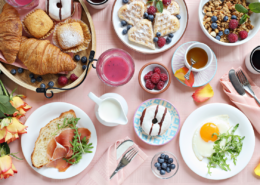15 Appliance Abuses That Are Costing You Money
Is it possible that without knowing it, you’re making damaging even dangerous mistakes with your household appliances? As I have been researching how to take care of our kitchen appliances so they will last longer, I’m learning about the most common appliance abuses that can lead to expensive repairs and even a shortened lifespan.
It’s true that these days household appliances just aren’t made to last for decades the way refrigerators, ranges, and other household appliances lasted back in our grandparents’ day. “Eight to ten years,” is what the salesman told us is what we could expect from our new refrigerator. He went on, “This machine is designed to stand up to years of use and ordinary wear and tear—assuming you don’t abuse it.”
Modern appliances are not made to deal with abuse, misuse, and mishaps that can damage them and lead to costly repairs. Are you making these damaging and potentially dangerous mistakes? Here are the most common appliance abuses and why you can’t put liquid soap in your dishwasher, open zippers in your washer, or too much food in your fridge.
Dishwasher Mistakes
Washing items with labels
It seems logical to remove paper labels glued to jars and bottles by running them through the dishwasher. But the paper and glue will totally clog the filter and the pump. This can lead to very costly repairs and a shortened life.
Filthy filter
Dishwashers have filters that catch bits of solid debris to keep them from recirculating onto plates, pans, silverware after the water and detergent have washed them away. A dishwasher that does not have a self-cleaning filter (read the manual) must be cleaned at least once a month.
Gel-type automatic dishwasher detergents are notorious for creating a build-up of gooey slime on the filter, which can lead to all kinds of expensive trouble. Clean the filter monthly without fail, and you’ll head off trouble down the line.
Dishwashing liquid
Let’s get this straight: Automatic dishwasher detergent is NOT the same as dishwashing liquid. You might think it won’t hurt this one time, but you will be painfully wrong to make that substitution—and have a big repair bill to prove it. Dishwashers are not built top handle suds! Newer machines have a kill switch that will flip the motherboard into one big flashing red FAIL message in the presence of suds. This requires an authorized repairman with codes and new motherboards to fix this situation. Do not ask how I know this, just trust me. Use only automatic dishwasher detergent made for automatic dishwashers, and nothing else.
Pro Tip
Finish Dishwasher Detergent wrapped tablets work fabulously without clogging the filter or tripping failure modes. I’ve tried them all and Finish is the Best Inexpensive option for my money. Hint: Drop the pod into the silverware basket instead of trying to jam it into the little detergent reservoir. You won’t end up with a partially dissolved pod.
Washer and Dryer Mistakes
Open zippers
It’s simple to do, easy to miss but mandatory that you catch. Zip up all zippers before putting those items into the laundry. Open zippers tumbling in a washer and or dryer are like little chainsaws that catch on other items in the tumble. The result is thread-pulls or worse, tiny holes in t-shirts and linens. Pull all zipper tabs all the way to the top, and do the same with bras and lingerie or other clothing with hooks.
Coins and other objects
They make a racket for sure, but coins and other type objects do more than that when left in pockets and sent through the laundry. They can beat up that drum and seriously damage the machine.
Refrigerator and Freezer Mistakes
Keeping fridge too full
Cramming too much food in the fridge cuts down on air circulation, which makes it impossible for the appliance to keep food cool enough. That creates a perfect environment for mold to build up. And it makes the motor work overtime which can lead to excessive wear and tear and an untimely fail. Like when you’re on vacation or holiday weekend. Keep the refrigerator about 3/4 full for optimal performance.
Blocking freezer vents
It’s true that also keeping a freezer at 3/4 capacity saves energy, but filling it improperly so that the vents are blocked makes the motor and condenser work harder than they should, leading them to burn out way before their time. Make sure you keep it full, but not to full capacity—and then that none of the vents are blocked.
Not cleaning condensers
When’s the last time you remembered to clean the condenser coils of your refrigerator and or free-standing freezer? These appliances are probably not the first spots in your house you think to clean regularly, but they need to be. Failure to do so is just asking for trouble. Clogged condensers have to work way too hard which means more electricity is required to keep them going, and that leads to early appliance death. Clean the condensers about every six months.
Moving it improperly
Never lay a refrigerator or freezer on its side or back. That can cause oil from the compressor to get into the cooling lines which will lead to fouled-up drainage and an appliance headed to the junkyard. If you need to move a refrigerator or freezer remove all of its contents. Then strap it tightly closed and transport it standing up in the exact manner it needs to stand in your next kitchen or garage.
Vacuum Cleaner Mistakes
Dirtbag too full
It’s a pain to stop and dump out the vacuum cleaner bag or debris cup before, after, or during your vacuuming, but you should. Let the bag or dust cup get too full, and your vacuum will strain to pick up debris. All that strain will force dust and debris into moving parts that must be kept free of that stuff in order to perform well. Certainly, that kind of abuse will shorten its usable life. Always clean out the bag after every use and keep an eye on its level while using it to avoid the dreaded vacuum cleaner abuse.
Dirty filters
Emptying the dirtbag or debris cup is a must. But don’t forget the filters. Check the owner manual to know exactly where they are, how to clean and maintain them, and when they need to be replaced. A vacuum cleaner needs to be able to “breathe” freely. Dirty filters, in essence, will eventually smother a vacuum’s motor.
Lamps Lighting Mistake
Wrong size lightbulbs
Need more light? Just put in a higher watt lightbulb, right? Wrong! Lamps or light sockets have a wattage limit that tells you the size bulb you can use and still be operating safely. If you use a light bulb with a wattage that’s too high, it will use more power and get hotter, potentially overheating or causing a fire. Before screwing in a light bulb, be sure to check for the correct wattage.
Small Appliance Mistakes
Leaving toaster plugged in
This is one kitchen appliance you should always unplug when not in use. Sometimes, according to ConsumerAffairs, toasters can catch fire with no warning. So don’t leave it alone while it’s in use and always unplug your toaster when you’re not using it. If your toaster ever does flare up, unplug it immediately. Out of an abundance of caution, treat your toaster oven in the same way. Unplug when not in use.
Never descaling a coffee maker
Limescale is a hard white substance consisting of calcium carbonate, deposited by water on the inside of pipes. It’s a hard substance that when allowed to build up over time, can cause a machine to fail long before it might have if that limescale had been removed. Read your machine’s manual then follow the routine de-scaling protocol. In nearly every case, running a pot full of white vinegar through the coffeemaking cycle, followed by several cycles with plain water to rinse it away, will do the trick.
Not fond of the smell of hot white vinegar? Bar Keepers Friend Coffee Maker Cleaner is a great product that will remove all the oily residue, tannins, and stains.
RELATED: 13 Surprising Ways to Use Your Coffee Maker
Garbage Disposal BIG Mistake
The wrong stuff
Garbage disposals are designed to take a lot of abuse, but nowhere near what some people put them through. As magical as they seem, garbage disposals do have their limits. If used improperly, you can do a lot of expensive damage to your plumbing. All of us know that certain things don’t belong in a garbage disposal, but it’s surprisingly hard to get a straight answer about what exactly those things are.
For sure, never put any non-food items into a garbage disposal—not glass, metal, or even paper. Peel off stickers and labels from produce or new kitchen gadgets and throw them in the garbage. Never stringy or tough stuff— fruit pits, bones, raw meat, and fruit or nutshells simply will not break down well enough to allow the disposal to do its job. No large quantities of grease or oil.
According to our friends over at This Old House, just because your disposal can grind something doesn’t mean it should. Eggshells are a great example of this: most disposals will eventually break them down, but they pose more danger to your pipes than to the disposal itself. The shards don’t dissolve in water, so they’re prone to building up over time and even clogging your pipes.
The same holds true for coffee grounds. While coffee grounds do not cause any damage to the disposal—actually, they are a good material to grind to sharpen and clean the grinding components—they can cause really bad clogs in the pipeline, which is why coffee grounds should NOT be thrown down a garbage disposal. They can collect on the floor of pipes, eventually stopping the flow of water altogether.
Pro Tip
Anything that swells and absorbs water—rice, pasta, grains, potato peels, and flour; anything that doesn’t break down quickly in water—is far too risky to place in a garbage disposal. These materials can blow up like a balloon in the drain and pipes, causing one major-league appliance abuse, if not a total failure.
First published:10-25-19; Updated with new info: 9-13-21
















This blog is exactly what I was looking for. Very well-researched. Thank you for sharing!!
I handwash the smaller mesh filters on my vacuum and use the shop vac to vacuum all the dirt out of the cylinder filter when it gets full of dirt. Those cylinders are expensive and the cleaning makes them last longer.
Happy reboot Mary!! One summer we, as a family, decided to unplug for one month. No phones, we had a landline for emergencies, no tv, except for family movie night on one weekend night a week and no outside news sources such as newspapers. It was glorious. We read, took long walks, looked at the stars around our fire pit and had family game nights. Bottom line we reconnected with what is important in life. At the end of 30 days the whole family, us and 5 kids, voted for another 30 days. All in all we did 3 months without regret, only blessings. When we went back it was with boundaries and limits. So hunker down Mary and renew your spirit. See you later!
Your hint about putting the dishwasher detergent pod in the silverware basket instead of the machine’s receptacle has saved me more aggravation than you can imagine! I don’t know why I never thought of it myself, but it has saved so much annoyance. Thanks!
Hello Mary, thanks for another incredible post from Everyday Cheapskate! 🙂 I love your idea of the “RE boot” and I may join you in this adventure.
I love your blog and please keep writing!
I love your idea to reboot. I already do some of you ideas, but I feel like watching conservative news stations gives me a more fair and balanced report. In moderation. I appreciate all you do for us cheapskates!